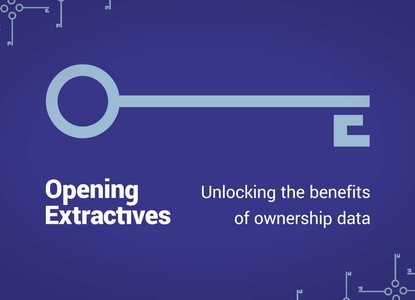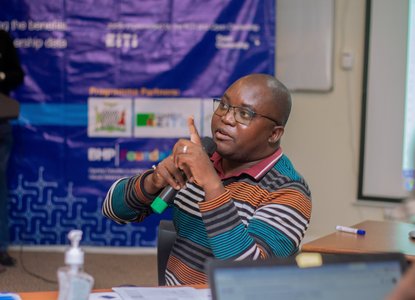Three continents, five projects, one goal: Improving extractives transparency

Using data to learn more about the real owners of extractive companies, promote good governance, and prevent corruption is at the heart of the new data use projects supported by the Opening Extractives programme
Oil, gas, and mineral wealth has too often been seized for personal gains instead of being invested in economic and social development benefiting citizens. Many corrupt individuals have taken advantage of absent or weak measures to disclose and access information about company owners, using opaque corporate structures to fulfil personal goals. This is where the Opening Extractives programme aims to drive change. By supporting countries to develop laws, systems, and tools to make reliable information about the identity of the real owners of companies available, the programme aims to make it harder for ill-intentioned actors to divert resources away from citizens.
In May 2022, the Opening Extractives team invited organisations, media centres, and individuals from the programme’s participating countries to submit ambitious proposals to advance the programme goals. Whilst one part of the programme team engages with governments and supports them in developing reforms, another part invests in those who will use the data made accessible through these reforms. Here is a snapshot of the successful projects.

Argentina and Zambia: Preventing corruption around the extraction of critical minerals
When there is a high demand for limited resources, the risks of corruption and infringements on human and environmental rights tend to be higher. The energy transition has been driving an increasing global demand for minerals needed for clean technologies, such as lithium and copper, two abundant resources in both Argentina and Zambia.
In Argentina, federal information gaps on the beneficial ownership of lithium extractive companies make it hard to hold relevant actors accountable and prevent risks. The Opening Extractives programme will support Fundeps to promote transparency in this sector. In partnership with Red Ruido, Fundeps will: raise awareness about the importance of transparency in the lithium extractive sector in Argentina; investigate the ownership and management of lithium extractive companies, assessing levels of application of the Extractive Industries Transparency Initiative (EITI) Standard in the biggest exploitation area; and support an informed and quality debate about the impact of the energy transition for the country.
In Zambia, about 70% of export earnings are from copper. Whilst the mining sector can hugely contribute to Zambia’s economy and domestic resource mobilisation, the country loses USD 600 million annually as tax loss because of corporate tax abuse. [1] Corporate transparency is therefore a key priority to unlocking resources for citizens. The Opening Extractives programme is supporting the Centre for Trade, Policy and Development (CTPD) to build on existing beneficial ownership data from the Zambian Patents and Companies Registration Agency (PACRA) and other sources of information to develop an online platform with data on key players in the mining sector. CTPD will also raise awareness on the advantages of beneficial ownership transparency through community radio and innovative social media content.
Mongolia: Shedding light on procurement processes in mining
The mining sector accounts for 57% of the total industrial production of Mongolia. [2] The Opening Extractives programme is supporting the Mongolian Data Club to train journalists in using a data platform to investigate procurement contracts of state-owned mining companies. In 2021, the Mongolian Data Club combined data from four publicly available sources into a platform to visualise various links around the activity of suppliers of state-owned enterprises in the mining sector (e.g. legal owners of companies, procurement bidding processes, involvement of politically exposed persons in state-owned enterprises, etc.) Facing a number of challenges to maintain and ensure effective use of the platform, the Mongolian Data Club will use Opening Extractives’ support to update and strengthen the platform. The Mongolian Data Club will train a selected team of journalists to use the platform to shed light on Mongolia’s procurement in the mining sector and support greater accountability and good governance of natural resources in the country.

Nigeria: Using the government’s latest reforms to accelerate accountability in the oil and mining sector
Nigeria is extremely rich in oil and gas, which represents over 85% of the country’s exports. Yet this wealth of resources has not always translated into major development impact for Nigerians. In the last few years, the Nigerian government has taken significant steps to address corruption and natural resource governance issues, including by passing new legislation and developing concrete systems to implement effective beneficial ownership transparency reforms. In this context, the Opening Extractives programme is supporting two projects:
- The non-governmental organisation (NGO) Policy Alert, in partnership with Tax Justice Network Africa, will implement #WetinWeGain3, an investigative project looking into the beneficial owners of four oil and gas companies and their involvement in crude oil swap deals in Nigeria. The project will also build the capacity of media and civil society organisations to be able to use and analyse existing beneficial ownership data.
- The NGO Directorio Legislativo will develop a partnership with a local Nigerian organisation to replicate the Joining the Dots model that was piloted in Colombia. It consists of creating a platform that enables cross-checking data about the beneficial owners of companies, politically exposed persons, and companies holding extractive licences to generate red flag alerts if any risks of conflict of interest and corruption are found.
Progress in advancing reforms on beneficial ownership transparency remains varied across the countries participating in the Opening Extractives programme. These projects will support countries’ efforts by raising awareness of the importance of this area, and encouraging data use by media and civil society actors to ensure greater accountability as governments make progress. The Opening Extractives team looks forward to learning from these projects and guiding other countries in implementing beneficial ownership transparency reforms.
If you’d like to hear more about these projects and our activities to support civil society organisations and journalists using data, get in touch.
You can also register for Disclosure, the Open Ownership newsletter, and the Opening Extractives newsletter.
Footnotes
[1] “The State of Tax Justice 2021”, Global Alliance for Tax Justice, Public Services International, and Tax Justice Network, November 2021, 37, https://taxjustice.net/wp-content/uploads/2021/11/State_of_Tax_Justice_Report_2021_ENGLISH.pdf.
[2] “Mongolia”, EITI, n.d., https://eiti.org/countries/mongolia.
Related articles and publications
Publication type
Blog post
Country focus
Argentina,
Nigeria,
Zambia,
Mongolia
Topics
Opening Extractives
Sections
Impact,
Implementation

